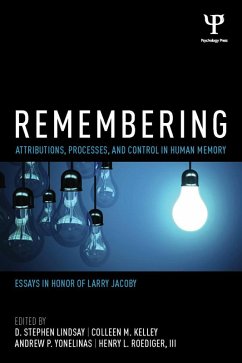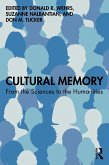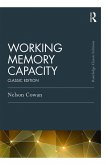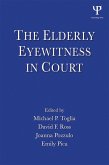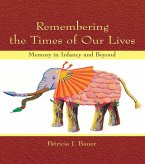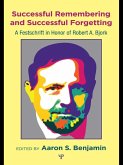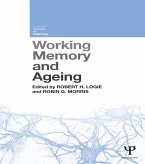Remembering (eBook, ePUB)
Attributions, Processes, and Control in Human Memory
Redaktion: Lindsay, D. Stephen; Roediger III, Henry L.; Yonelinas, Andrew P.; Kelley, Colleen M.


Alle Infos zum eBook verschenken

Remembering (eBook, ePUB)
Attributions, Processes, and Control in Human Memory
Redaktion: Lindsay, D. Stephen; Roediger III, Henry L.; Yonelinas, Andrew P.; Kelley, Colleen M.
- Format: ePub
- Merkliste
- Auf die Merkliste
- Bewerten Bewerten
- Teilen
- Produkt teilen
- Produkterinnerung
- Produkterinnerung

Hier können Sie sich einloggen

Bitte loggen Sie sich zunächst in Ihr Kundenkonto ein oder registrieren Sie sich bei bücher.de, um das eBook-Abo tolino select nutzen zu können.
In this volume, many of the world's foremost memory scientists present their cutting-edge research into the nature of human memory. Major themes include the foundations of memory theory; the contribution of different processes to memory performance; the latest findings on cognitive control; developmental perspectives with a special emphasis on aging; and the clinical, social, and forensic applications of memory research. This fresh and wide-ranging overview of the field provides an important resource for researchers and advanced students in cognitive psychology and neuroscience.
- Geräte: eReader
- mit Kopierschutz
- eBook Hilfe
- Größe: 5.4MB
![Cultural Memory (eBook, ePUB) Cultural Memory (eBook, ePUB)]() Cultural Memory (eBook, ePUB)45,95 €
Cultural Memory (eBook, ePUB)45,95 €![Working Memory Capacity (eBook, ePUB) Working Memory Capacity (eBook, ePUB)]() Nelson CowanWorking Memory Capacity (eBook, ePUB)47,95 €
Nelson CowanWorking Memory Capacity (eBook, ePUB)47,95 €![The Elderly Eyewitness in Court (eBook, ePUB) The Elderly Eyewitness in Court (eBook, ePUB)]() The Elderly Eyewitness in Court (eBook, ePUB)65,95 €
The Elderly Eyewitness in Court (eBook, ePUB)65,95 €![Remembering the Times of Our Lives (eBook, ePUB) Remembering the Times of Our Lives (eBook, ePUB)]() Patricia J. BauerRemembering the Times of Our Lives (eBook, ePUB)63,95 €
Patricia J. BauerRemembering the Times of Our Lives (eBook, ePUB)63,95 €![Successful Remembering and Successful Forgetting (eBook, ePUB) Successful Remembering and Successful Forgetting (eBook, ePUB)]() Successful Remembering and Successful Forgetting (eBook, ePUB)43,95 €
Successful Remembering and Successful Forgetting (eBook, ePUB)43,95 €![Memory and Aging (eBook, ePUB) Memory and Aging (eBook, ePUB)]() Memory and Aging (eBook, ePUB)45,95 €
Memory and Aging (eBook, ePUB)45,95 €![Working Memory and Ageing (eBook, ePUB) Working Memory and Ageing (eBook, ePUB)]() Working Memory and Ageing (eBook, ePUB)57,95 €
Working Memory and Ageing (eBook, ePUB)57,95 €-
-
-
Dieser Download kann aus rechtlichen Gründen nur mit Rechnungsadresse in A, B, BG, CY, CZ, D, DK, EW, E, FIN, F, GR, HR, H, IRL, I, LT, L, LR, M, NL, PL, P, R, S, SLO, SK ausgeliefert werden.
- Produktdetails
- Verlag: Taylor & Francis eBooks
- Seitenzahl: 430
- Erscheinungstermin: 13. November 2014
- Englisch
- ISBN-13: 9781317619222
- Artikelnr.: 41835920
- Verlag: Taylor & Francis eBooks
- Seitenzahl: 430
- Erscheinungstermin: 13. November 2014
- Englisch
- ISBN-13: 9781317619222
- Artikelnr.: 41835920
- Herstellerkennzeichnung Die Herstellerinformationen sind derzeit nicht verfügbar.
Adaptive Memory: Novel Findings Acquired Through Forward Engineering. Bjork
Forgetting as a Friend to Learning. Neely
Testing and Retrieval Practice Effects: Assessing the Contributions of Encoding and Retrieval Mechanisms. Dunlosky
The Contribution of Processing Fluency (and Beliefs) to People's Judgments of Learning. Hunt
Using Process Dissociation Procedure to Establish Boundaries of Process Dissociation Theory: The Case of Category Cued Recall. Part 2: Memory and Beyond: Separating Processes. Yonelinas
Dissociating Processes within Recognition
Perception
and Working Memory. Milliken
Event Integration
Awareness
and Short-Term Remembering. Dobbins
Forecasting versus Fitting; Dissociating versus Describing: Celebrating Larry Jacoby's Methodological Approach to Understanding Recognition. McElree
Memory Processes Underlying Real-time Language Comprehension. Part 3: Cognitive Control. Logan
Memory is Everywhere. Bugg
"Automatic Control" of Interference: Evidence and Implications for Aging. Koriat
Knowing by Doing: When Metacognitive Monitoring Follows Metacognitive Control. Kelley
Constrained Retrieval in Recognition Memory. Lindsay
Recognition Memory Response Bias is Conservative for Paintings and We Don't Know Why. Part 4: Development and Aging. Craik
Familiarity and Recollections: Interactions with Larry Jacoby. Jennings
Improving Memory and Executive Function in Older Adults with Memory Impairments through Recollection-Lag Training. Sommers
You Aren't Listening to What I Said: False Hearing in Young and Older Adults. Balota
Attention
Variability
and Biomarkers in Alzheimer's Disease. Part 5: Clinical
Social
and Forensic Applications. Harrison
Taxonomy of Transfer to Cognitive Abilities: The Case of Working Memory Training. Hertel
Cognition in Emotional Disorders: An Abundance of Habit and a Dearth of Control. Payne
Behavior Priming as Memory Misattribution. Roediger
Understanding the Relation between Confidence and Accuracy in Reports from Memory.
Adaptive Memory: Novel Findings Acquired Through Forward Engineering. Bjork
Forgetting as a Friend to Learning. Neely
Testing and Retrieval Practice Effects: Assessing the Contributions of Encoding and Retrieval Mechanisms. Dunlosky
The Contribution of Processing Fluency (and Beliefs) to People's Judgments of Learning. Hunt
Using Process Dissociation Procedure to Establish Boundaries of Process Dissociation Theory: The Case of Category Cued Recall. Part 2: Memory and Beyond: Separating Processes. Yonelinas
Dissociating Processes within Recognition
Perception
and Working Memory. Milliken
Event Integration
Awareness
and Short-Term Remembering. Dobbins
Forecasting versus Fitting; Dissociating versus Describing: Celebrating Larry Jacoby's Methodological Approach to Understanding Recognition. McElree
Memory Processes Underlying Real-time Language Comprehension. Part 3: Cognitive Control. Logan
Memory is Everywhere. Bugg
"Automatic Control" of Interference: Evidence and Implications for Aging. Koriat
Knowing by Doing: When Metacognitive Monitoring Follows Metacognitive Control. Kelley
Constrained Retrieval in Recognition Memory. Lindsay
Recognition Memory Response Bias is Conservative for Paintings and We Don't Know Why. Part 4: Development and Aging. Craik
Familiarity and Recollections: Interactions with Larry Jacoby. Jennings
Improving Memory and Executive Function in Older Adults with Memory Impairments through Recollection-Lag Training. Sommers
You Aren't Listening to What I Said: False Hearing in Young and Older Adults. Balota
Attention
Variability
and Biomarkers in Alzheimer's Disease. Part 5: Clinical
Social
and Forensic Applications. Harrison
Taxonomy of Transfer to Cognitive Abilities: The Case of Working Memory Training. Hertel
Cognition in Emotional Disorders: An Abundance of Habit and a Dearth of Control. Payne
Behavior Priming as Memory Misattribution. Roediger
Understanding the Relation between Confidence and Accuracy in Reports from Memory.
